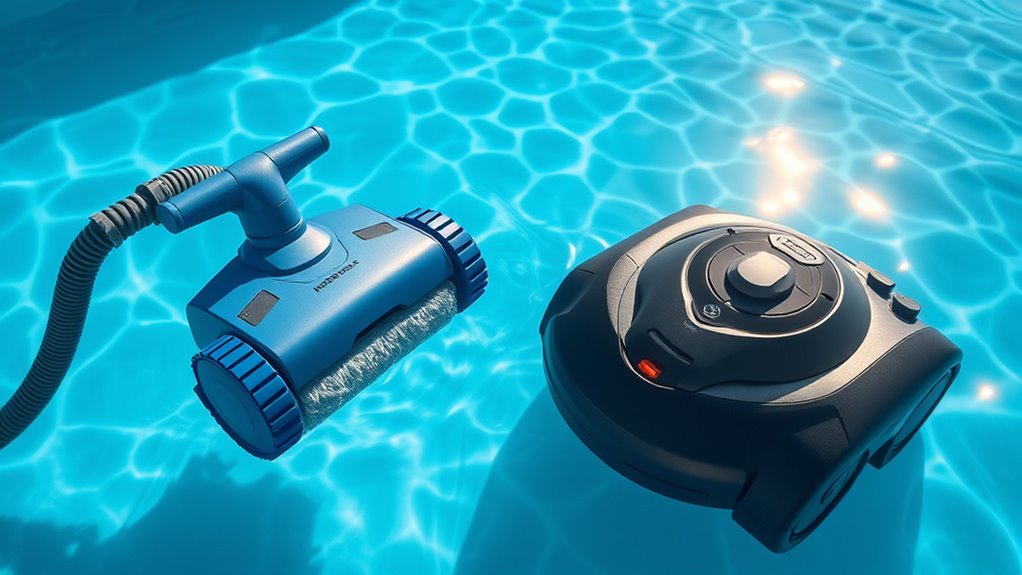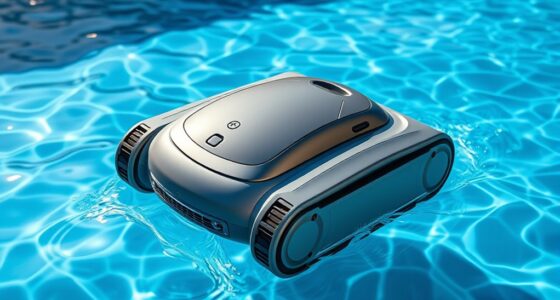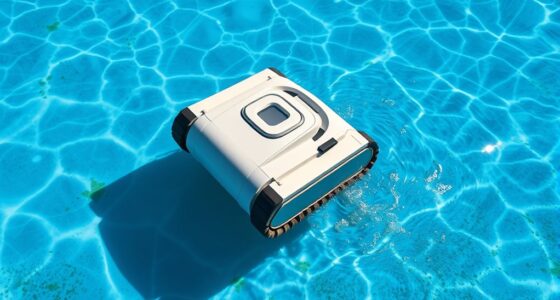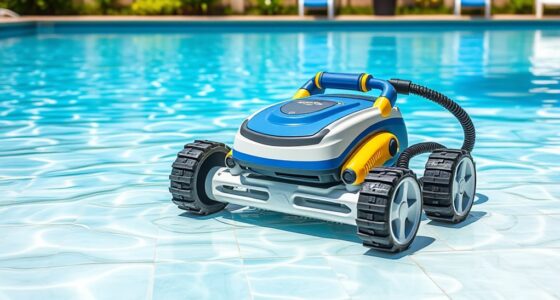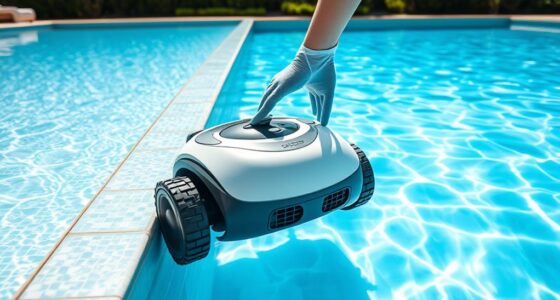Pressure pool cleaners are highly effective at quickly removing dirt, algae, and debris with strong suction, making your pool sparkle. They’re easy to operate and maintain, but may generate more noise and require proper installation tailored to your pool setup. While they offer great cleaning power, some models can be costly and need regular upkeep to stay durable. Want to know more about weighing these pros and cons? Keep going for a full breakdown.
Key Takeaways
- Pros: Powerful suction and efficient cleaning, especially for large debris and algae removal.
- Cons: Require manual setup and connection to pool filter system, which can be complex.
- Pros: Generally affordable with good durability, offering long-term value.
- Cons: Generate more noise during operation and may need frequent maintenance.
- Pros: Compatible with many pool types and relatively easy to install with proper matching.
Efficiency and Cleaning Performance
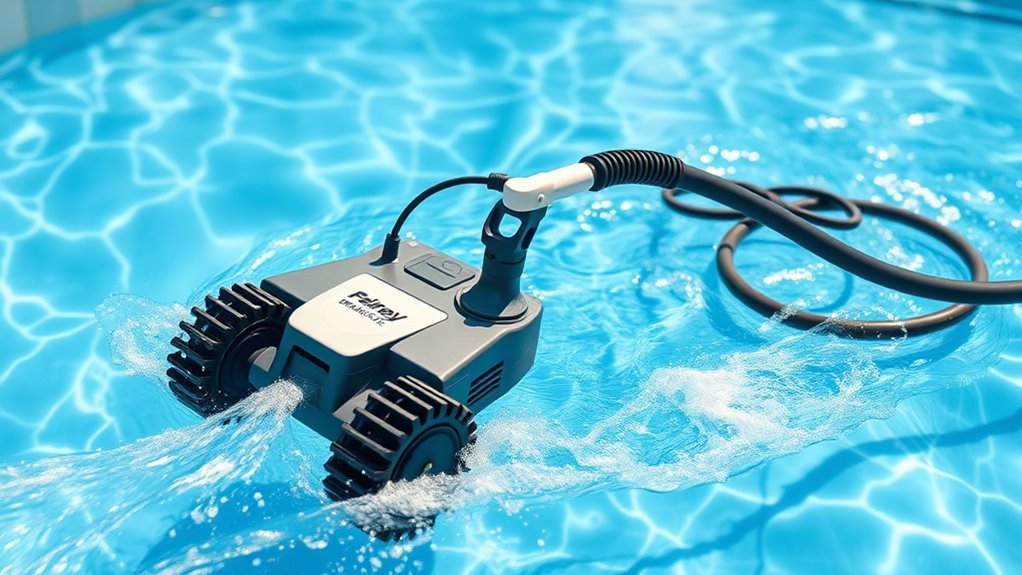
Pressure pool cleaners are known for their impressive efficiency and strong cleaning performance. They excel at removing dirt, algae, and debris from your pool’s surfaces quickly. Thanks to their powerful suction, they can cover large areas effectively, reducing cleaning time. Additionally, they often generate more noise during operation, which could be disruptive if your pool is close to living spaces or neighbors. A new sentence with powerful suction and the rest of the sentence. Despite this, their ability to deliver thorough cleanings makes them popular among pool owners who prioritize performance. Keep in mind that while they’re efficient at cleaning, their energy use and noise levels are factors worth considering before making a purchase. For those seeking a cost-effective option, it’s important to weigh the higher energy consumption against their cleaning capabilities. Regular maintenance of the cleaner’s parts can help optimize their performance and extend their lifespan. Additionally, selecting a cleaner with durable components can contribute to longer-lasting effectiveness and reduce replacement costs. Proper maintenance routines are essential to keep these cleaners functioning at peak efficiency and to prevent breakdowns.
Ease of Use and Convenience
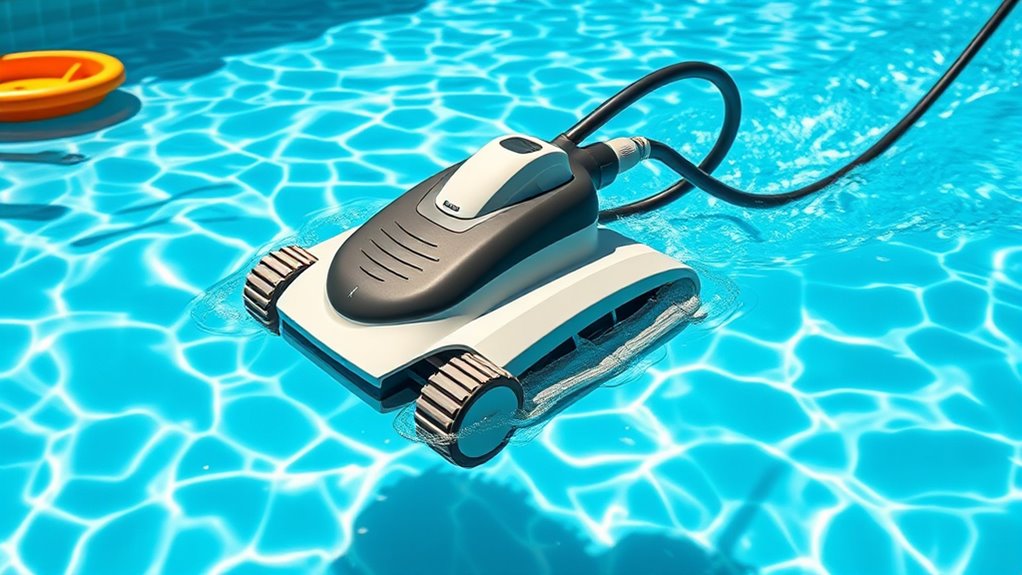
While pressure pool cleaners are highly effective at cleaning, their ease of use and convenience are equally important considerations. Many models require manual operation, which means you need to guide or position them properly for ideal coverage. This can be time-consuming and might feel less convenient compared to fully automated options. However, some pressure cleaners are designed with user friendliness in mind, featuring simple hookups and easy-to-follow instructions. If you prefer a straightforward setup and minimal fuss, look for models that prioritize ease of operation and mindfulness of physical sensations. Additionally, the maintenance requirements of pressure pool cleaners can influence overall convenience, as regular upkeep may be necessary to keep them functioning properly. The technology used in these cleaners can also impact their overall ease, with newer models often offering more intuitive controls. For example, some advanced models incorporate automatic shut-off features to prevent overuse or damage, enhancing user experience. Overall, pressure pool cleaners offer decent convenience, but your experience will depend on how intuitive the operation is and whether you’re comfortable with manual adjustments during cleaning sessions.
Compatibility and Installation Considerations
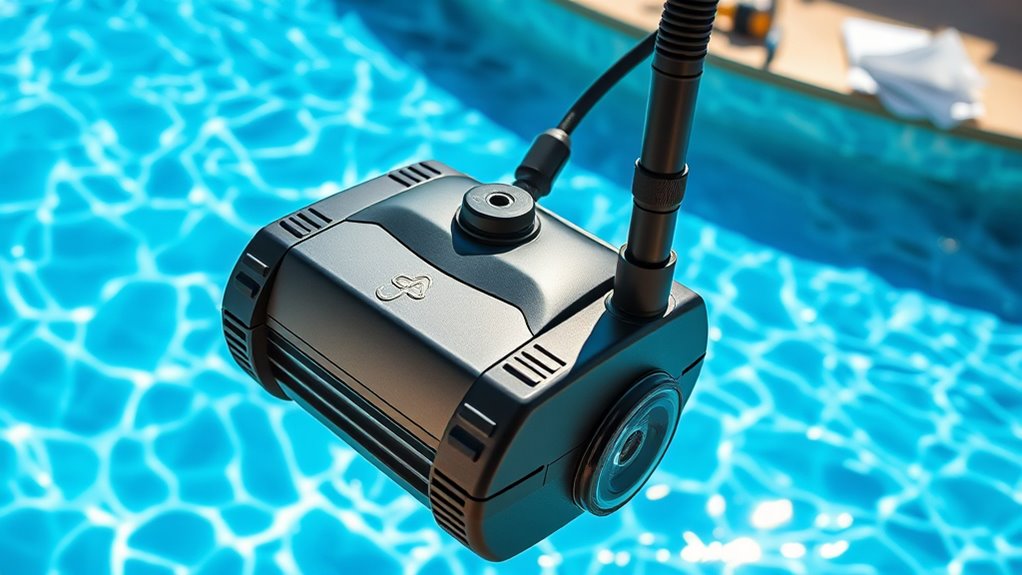
Before choosing a pressure pool cleaner, it’s essential to contemplate its compatibility with your pool’s setup and the ease of installation. Ensuring filter compatibility is vital; some cleaners require specific filter types or sizes. Installation complexity varies, so consider whether you’re comfortable with plumbing or need professional help. To visualize, here’s a quick comparison:
| Model Type | Filter Compatibility | Installation Complexity |
|---|---|---|
| Basic Pressure Cleaner | Works with standard filters | Easy, DIY setup |
| Advanced Model | May need specialized filters | Moderate, some plumbing required |
| Automated System | Usually compatible with various filters | Complex, professional installation |
| In-Ground Compatible | Designed for in-ground pools | Varies, often more involved |
| Above-Ground Compatible | Fits most above-ground pools | Usually straightforward |
Choose wisely to match your pool’s setup and your comfort with installation. Additionally, pool maintenance best practices can prolong the lifespan of your cleaner and ensure optimal performance. Proper filter cleaning can also prevent common issues and improve overall efficiency, especially when selecting the right type of filter for your cleaner. Regularly inspecting and maintaining your filters is crucial for efficient operation and longevity of your pressure cleaner.
Maintenance and Durability
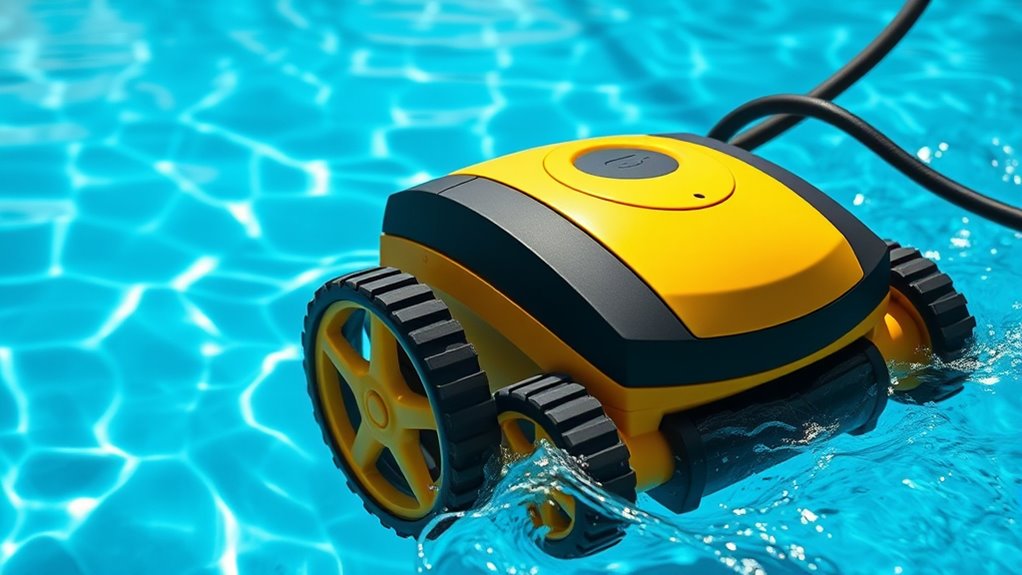
Maintaining your pressure pool cleaner properly can greatly extend its lifespan and ensure consistent cleaning performance. Regularly check and clean filter types—whether they’re mesh, cartridge, or multi-layer filters—to prevent clogs that hinder operation. Silly tantrums can sometimes occur during maintenance, adding humor to routine tasks. Inspect the power source, whether it’s connected to a dedicated outlet or powered by your pool’s pump, to ensure it’s functioning correctly and safely. Keep hoses and connections free of debris, and replace worn parts as needed. Proper storage during off-season or storms also helps prevent damage. Using high-quality materials and routine upkeep enhances the durability of your cleaner. Durability depends on quality materials and routine upkeep. By staying attentive to filter maintenance and monitoring your power source, you reduce wear and tear, which prolongs your cleaner’s efficiency and operational life. Additionally, understanding self-watering plant pots can help you maintain planters that support your garden’s health, much like how proper maintenance supports your pool cleaner’s longevity. Regularly inspecting connections and seals is also essential to prevent leaks that can compromise cleaning efficiency and cause potential damage.
Cost and Value
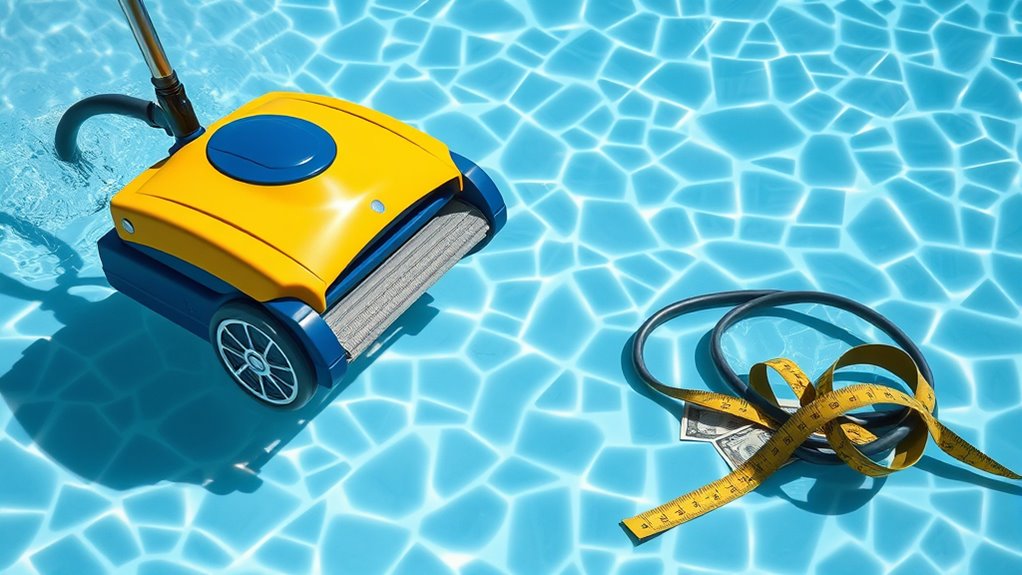
Pressure pool cleaners vary widely in cost, making it important to weigh their price against the value they provide. Your choice depends on factors like pricing options and potential long-term savings. Cheaper models might seem attractive initially, but they may require more frequent repairs or replacements. Higher-end cleaners often come with advanced features that save you time and effort, offering better overall value. Consider the durability and effectiveness of the cleaner, as these influence long-term savings. Investing in a slightly more expensive model could reduce maintenance costs over time. Remember, the initial price isn’t everything—look at the cleaner’s efficiency, lifespan, and how it fits your pool size. Additionally, evaluating the performance features of different models can help you select the most suitable option for your needs. Choosing a model with durability and reliability can result in fewer breakdowns and replacements, ultimately saving money. Opting for a cost-effective investment ensures you make a smart purchase that keeps your pool clean without breaking the bank. Recognizing the importance of long-term value can guide you toward a more satisfying and economical choice.
Frequently Asked Questions
Are Pressure Pool Cleaners Suitable for All Pool Shapes?
Pressure pool cleaners work well with most pool shapes, thanks to their pool shape adaptability. You’ll find they easily navigate around corners and curves, making cleaning efficient. However, consider cost considerations, as some models may be pricier, especially for irregularly shaped pools. If your pool has unique features or complex design, check if the cleaner suits your shape before purchasing. Overall, they’re versatile but weigh your budget and pool shape first.
How Do Pressure Cleaners Handle Debris Like Leaves and Twigs?
Leaves and twigs pose a unique challenge for pressure pool cleaners. While they excel at debris removal, large leaves and twigs may clog the intake or bypass the system, requiring manual leaf collection. The suction power helps dislodge debris, but for efficient leaf collection, you might need to clear bigger debris manually first. Overall, pressure cleaners handle most debris well, but heavy or bulky leaves may need extra attention.
Can Pressure Pool Cleaners Be Used in Saltwater Pools?
You can use pressure pool cleaners in saltwater pools, but you should check for saltwater compatibility first. Look for models with corrosion resistance to prevent damage from salt. Using a saltwater-compatible pressure cleaner guarantees durability and effective cleaning. Proper maintenance and choosing the right cleaner help prolong its lifespan. Always verify the manufacturer’s specifications to ensure your pressure pool cleaner is suitable for saltwater environments.
Do Pressure Cleaners Require Professional Installation?
You might wonder if pressure pool cleaners need professional installation. Generally, installation requirements are minimal, and many owners opt for DIY setup since it’s straightforward and user-friendly. However, if your pool system is complex or you’re unsure, hiring a professional can ensure proper installation and peak performance. Ultimately, assess your comfort with installation tasks versus the benefits of expert help to decide what’s best for your pool.
What Safety Precautions Should Be Taken When Operating a Pressure Cleaner?
You might find it tempting to dive right in, but safety first. When operating a pressure cleaner, always prioritize electrical safety by ensuring the power is off before starting. Wear proper personal protective equipment like gloves and goggles to shield yourself from debris and high-pressure water. Keep the area clear of bystanders, and never operate the cleaner near electrical outlets or wet surfaces, minimizing risks of shocks or injuries.
Conclusion
Pressure pool cleaners can save you time, with studies showing they clean up to 50% faster than manual scrubbing. While they’re easy to use and durable, consider your pool size and budget before investing. If you want a hassle-free way to keep your pool sparkling, a pressure cleaner might be worth it. Just weigh the pros and cons to find the best fit for your needs—and enjoy a cleaner pool with less effort!
